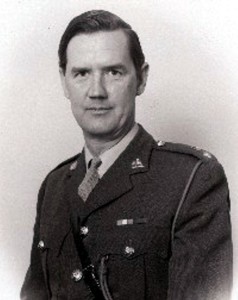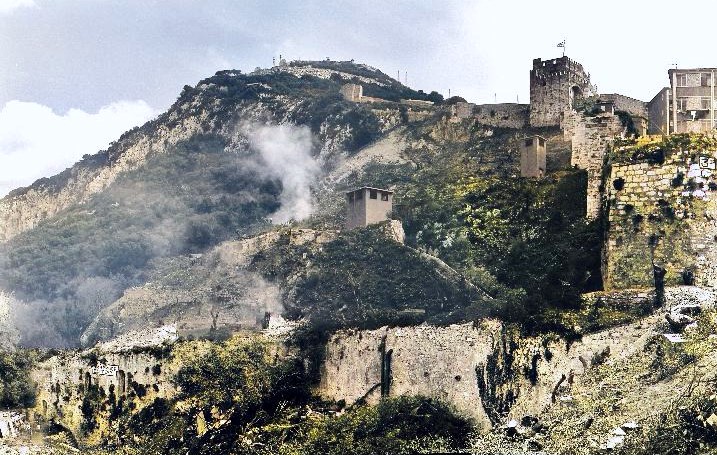Lt Colonel Cumberlege
 The return of the battalion from Northern Ireland, my assuming command from Dick Mundell and the build up to and execution of the Falklands War, all coincided in April 1982. The latter influenced our planning and training in as much as I was at one time asked when we would be ready to take part in the war. We had Exercise Pond Jump West planned which was the ideal preparation should it have been necessary to head south; but in the event the war was over by the time we returned to Catterick in July.
The return of the battalion from Northern Ireland, my assuming command from Dick Mundell and the build up to and execution of the Falklands War, all coincided in April 1982. The latter influenced our planning and training in as much as I was at one time asked when we would be ready to take part in the war. We had Exercise Pond Jump West planned which was the ideal preparation should it have been necessary to head south; but in the event the war was over by the time we returned to Catterick in July.
The remainder of the year was relatively uneventful: Exercise Keystone in Germany, individual training, preparation for our move to Gibraltar, KAPE tour and of course the annual assault on the Army Rugby Cup. We won the UK Cup in 1982 under Chris Gilbert before being beaten by BAOR Engineer Regiment in a rather unsatsfactory Army final in Aldershot. Never having been renowned for my Rugby prowess, it was with a certain trepidation that I found myself sitting between two very senior and knowledgeable exponents of the game. The conversation didn’t exactly flow.
Gibraltar was an attractive proposition in as much as it was a family sunshine posting and provided the battalion with a well earned rest. There were plenty of opportunities to have fun, enhance our reputation (the battalion was fondly remembered from its tour 30 years earlier); but fraught with potential PR nightmares.
My priorities for the battalion were relatively straight forward. First and foremost to maintain our military skills which was always going to be difficult given the space and facilities available. Incentive was sharpened by the rumour that Margaret Thatcher’s edict to the Defence Chiefs that what had happened in the Falklands would not happen in Gibraltar. Each company was able to train in turn at the Portuguese Training Centre in Estoril and on two occasions we disrupted Gibraltar’s sleepy routine with a full scale battalion exercise throughout the rock. All this plus any number of ideas to make the training interesting, fun and worthwhile.
Drill was always going to play an important part in our lives. Monday morning guard mountings outside the Convent and the Ceremonies of the Keys were in full swing, since curtailed for manning and security reasons. Our Queen’s Birthday Parades in 1983 and 1984 (under the stewardships of RSM Sam Basu and RSM Bob Heron respectively) were marked by the firing of a Feu de Joie which, so my father told me, had not been fired since the 1920’s in India by the 2nd Battalion. On that occasion, during a rehearsal, the noise of the firing caused the 2ic’s horse to rear, depositing the said 2ic on the ground behind. For the parade itself the CO gave the order “the parade will fire the feu de Joie….hold on Bonzo…..fire!”
Many battalions before us had tended to keep themselves apart from the local populace. I felt this wrong and counter productive. Each company identified its own community project…a school, boys club, medical centre, kindergarten or whatever and the return in goodwill was inestimable. However “Operation Steep Slope” became the battalion project which entailed clearing mountains of rubbish and squatters’ homes from in front of the old City Walls. The task took 15 months to complete. Whilst it may seem to be an odd and filthy project to inflict on the battalion, it was enormously appreciated by Gibraltar as a whole and accepted with great patience if not enthusiasm by the battalion. It resulted in the flood lighting of the City Walls for the first time ever (see the illustration) and eventually the award of the 1984 Wilkinson Sword of Peace for fostering good relations with the local community. Sadly 21 years later the area is overgrown and the lights smashed.

Eventually the border, which had been closed since our arrival, was opened to pedestrians allowing members of the battalion to enjoy the fruits of the Costa del Sol; in the meantime we entered into every activity we could find on the rock: The Hindoostan Rowing Club was resurrected with Simon Morgan the Captain of Boats; amateur dramatics (“The 15 minute Hamlet”); sailing (Brig Tony Firth shipped out a Victory Class yacht which he had found for us in Portsmouth), fishing, wind surfing, water skiing, pot holing, cricket, hockey, and so on. Rugby was difficult, but I like to think that under Peter Robinson’s care, our skills didn’t suffer irreversibly. It would be wrong not mention the band who were just outstanding, under Bandmaster Taylor from beginning to end; plus the countless fundraising events in support of Gibraltarian charities.
Commanding 1DWR in Gibraltar was very different to that experienced by my predecessors and those coming after me. I was supported by marvellous administrators under Bob Tighe, some excellent company commanders and two first class 2i/c’s in Alan Westcob and Peter Gardner. It was a wonderful privilege, ending with a very civilised handover to Johnny Walker around the swimming pool at the Rock Hotel.
CRC
Nov 2005